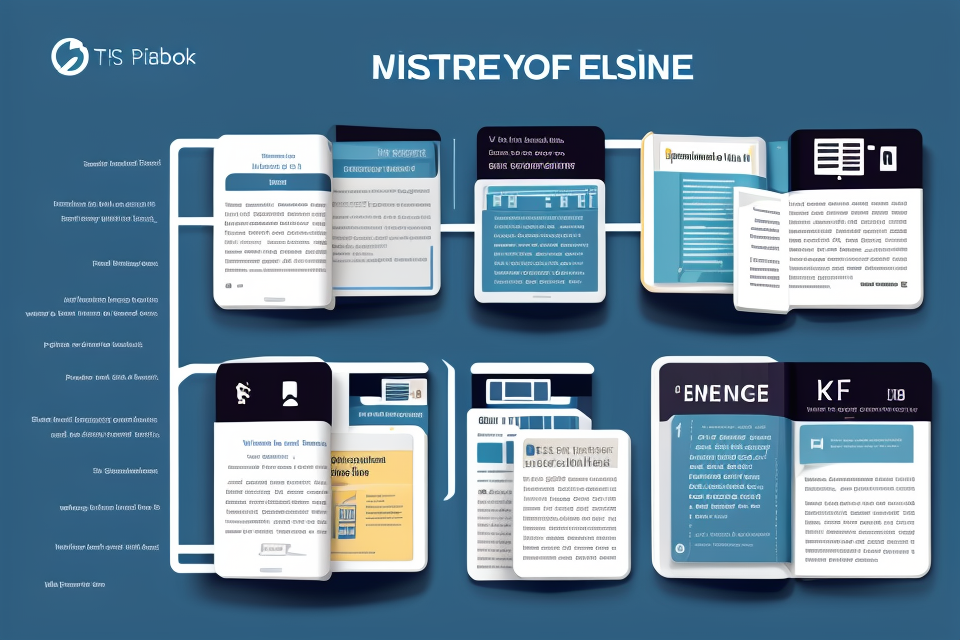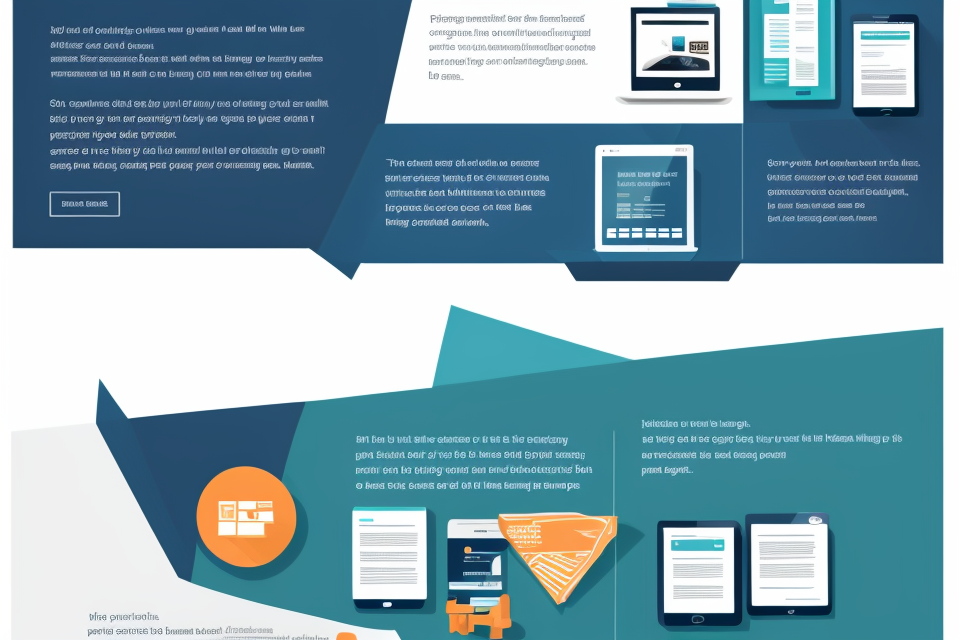
Reading is one of the most cherished hobbies for many individuals. With the advent of technology, the way we read has changed dramatically. The two most popular forms of reading are books and eBooks. Both have their own set of advantages and disadvantages. While books have a tactile experience and a certain nostalgic charm, eBooks offer convenience and accessibility. But, which format is better? Is it better to read books or eBooks? In this article, we will compare the two formats and determine which one is better. So, let’s dive in to explore the pros and cons of both formats and find out which one comes out on top.
Pros and Cons of Reading Books
Advantages of Reading Books
- Tactile Experience: Physical books offer a tactile experience that eBooks cannot replicate. The feel of paper, the weight of the book, and the sound of turning pages all contribute to a more immersive reading experience.
- Collectible Quality: Books can be collected and displayed as a form of personal expression, serving as a conversation starter and adding aesthetic value to a space.
- Accessibility: Books can be read offline, making them accessible in situations where electronic devices may not be available or charged.
Disadvantages of Reading Books
- Portability: Physical books are heavier and bulkier than eBooks, making them less convenient for travel or carrying around daily.
- Limited Storage: Physical books require shelf space, which can quickly become an issue for avid readers with large collections.
- Maintenance: Books require maintenance, such as dusting, avoiding exposure to moisture, and occasionally rebounding or repairing.
Reading Comprehension and Retention
- Studies suggest that reading books in print may lead to better comprehension and retention of information due to the linear progression of content and the need to interpret visual cues from page numbers and layout.
- Digital Distractions: eBooks may offer more distractions, such as hyperlinks, search functionality, and the ability to multi-task, which can negatively impact reading comprehension and retention.
Environmental Impact
- Carbon Footprint: The production of physical books requires more energy and resources than eBooks, contributing to a higher carbon footprint.
- Sustainability: eBooks eliminate the need for physical storage and transportation, reducing waste and resource consumption.
Conclusion
The debate between reading books and eBooks ultimately boils down to personal preference and situational factors. While physical books offer a unique tactile experience and can be more conducive to reading comprehension and retention, they also have drawbacks in terms of portability, storage, and maintenance. eBooks, on the other hand, provide convenience, accessibility, and sustainability but may negatively impact reading comprehension and retention due to digital distractions. Ultimately, readers must weigh the pros and cons of each format and choose the one that best suits their needs and preferences.
Benefits of Reading Books
Improved Memory Function
How Reading Books Can Enhance Memory Retention
Reading books has been shown to improve memory function in both children and adults. This is because reading requires active engagement with the material, which strengthens neural connections in the brain and enhances memory retention. In fact, studies have found that reading can improve working memory, which is the ability to temporarily store and manipulate information.
Emotional Intelligence Development
Understanding and Empathy through Storytelling
Reading books can also help develop emotional intelligence by allowing readers to empathize with characters and understand their emotions. This is because reading stories exposes readers to a range of emotions and experiences that they may not encounter in their daily lives. By identifying with characters and understanding their motivations and feelings, readers can develop greater empathy and emotional intelligence.
Critical Thinking Skills
Analyzing Plot, Character Development, and Themes
Reading books can also enhance critical thinking skills by requiring readers to analyze plot, character development, and themes. This involves making connections between different elements of the story, drawing conclusions about the characters and their motivations, and considering the broader implications of the story. By engaging in this type of analysis, readers can develop their critical thinking skills and become better problem-solvers.
Drawbacks of Reading Books
Space and Storage
Limited Physical Space for Book Collection
One of the primary drawbacks of reading physical books is the limited space for storing them. As a book collection grows, it can quickly take up a significant amount of space, especially in smaller homes or apartments. This can make it difficult to accommodate new books or create a dedicated reading area. Moreover, as more books are added, the existing books may become disorganized, making it harder to locate a specific title.
Preservation and Maintenance of Books
Physical books require regular maintenance to maintain their condition. Dust, humidity, and exposure to light can damage book covers, pages, and bindings over time. To preserve their collection, readers must invest time and effort in regularly cleaning and maintaining their books. This includes dusting, wiping down covers, and protecting them from direct sunlight. Additionally, older or rare books may require special care, such as handling them with gloves or storing them in protective cases.
Portability
Weight and Size of Physical Books
Physical books can be cumbersome and heavy, especially when carrying multiple titles. The weight and size of books can make them uncomfortable to hold for extended periods, leading to hand and arm fatigue. Additionally, books can be fragile, and readers may be hesitant to carry them around or travel with them, fearing damage or loss.
Accessibility and Convenience of eBooks
In contrast, eBooks offer a level of accessibility and convenience that physical books cannot match. eBooks can be downloaded instantly and accessed from multiple devices, such as smartphones, tablets, or e-readers. This makes it easy to carry a vast library of books with no weight or size constraints. Additionally, eBooks can be searched, bookmarked, and annotated digitally, making it easier to access and review information.
Overall, while physical books offer a tactile and sensory experience that can enhance reading, their drawbacks in terms of space, storage, preservation, and portability may make them less practical for some readers. eBooks, on the other hand, offer convenience and accessibility that can be highly appealing to those who value digital convenience.
Pros and Cons of eBooks
While eBooks have gained immense popularity in recent years, the debate on whether they are better than physical books continues. Here, we weigh the pros and cons of eBooks to help you make an informed decision.
Pros of eBooks
- Portability: One of the significant advantages of eBooks is their portability. eBooks can be stored on a single device and accessed from anywhere, making them perfect for travelers. You can carry your entire library with you wherever you go, without having to worry about the weight of physical books.
- Affordability: eBooks are often cheaper than physical books, particularly for international readers. This is because eBooks do not require printing, shipping, or physical storage costs. Additionally, eBooks can be downloaded instantly, making them more convenient and cost-effective.
- Accessibility: eBooks are accessible to people with visual impairments, as they can be read aloud using text-to-speech technology. eBooks also offer features like adjustable font sizes, line spacing, and background colors, making them more accessible to readers with diverse needs.
- Environmental benefits: eBooks are a more environmentally friendly option as they do not require paper, ink, or shipping. This makes them a better choice for those who are conscious about their carbon footprint.
Cons of eBooks
- Lack of tangibility: One of the biggest drawbacks of eBooks is the lack of tangibility. eBooks do not have the same tactile experience as physical books, and some readers find it difficult to get lost in the story without the feel of paper.
- Dependence on technology: eBooks require a device to read them, which can be a drawback for some readers. Battery life, screen size, and reading experience can all impact the overall reading experience. Additionally, technology can be a barrier for some readers, particularly those who are not comfortable with digital devices.
- Limited availability: While eBooks are becoming increasingly popular, some books may not be available in eBook format. This can be a significant drawback for readers who prefer to read a specific book that is only available in physical form.
- Pricing: While eBooks are often cheaper than physical books, some eBooks can be priced higher than their physical counterparts. This can be a significant drawback for readers who are on a budget and prefer to save money on their reading material.
Benefits of eBooks
Convenience and Accessibility
Instant Access to eBooks
One of the most significant advantages of eBooks is the instant access they provide. With a few clicks, readers can download eBooks onto their devices and start reading immediately, without having to wait for shipping or visit a physical bookstore. This convenience is particularly beneficial for those who are short on time or have limited access to bookstores.
Reading on Multiple Devices
Another advantage of eBooks is the ability to read them on multiple devices. With eBooks, readers can easily switch between devices, such as a tablet, phone, or e-reader, without losing their place in the book. This flexibility is especially useful for those who travel frequently or have busy schedules that require them to switch between devices throughout the day.
Cost-Effectiveness
Saving Money on Physical Books
eBooks are often more cost-effective than physical books, particularly for those who read frequently. With eBooks, readers can save money on shipping and handling fees, as well as the cost of physical books themselves. Additionally, eBooks often have lower prices than their physical counterparts, making them an attractive option for budget-conscious readers.
Easy Online Purchasing and Download
Buying and downloading eBooks is also typically easier than purchasing physical books. With just a few clicks, readers can browse a vast selection of eBooks online, purchase their chosen titles, and have them automatically delivered to their devices. This convenience eliminates the need for trips to physical bookstores and makes it easy for readers to discover new books and authors.
Drawbacks of eBooks
One of the main drawbacks of eBooks is screen fatigue. Prolonged exposure to digital screens can cause eye strain, headaches, and neck pain. Additionally, the blue light emitted by electronic devices can disrupt sleep patterns and make it difficult to fall asleep.
Another drawback of eBooks is the lack of tactile experience. Unlike physical books, eBooks do not have the same feeling of holding a book, turning pages, and physically interacting with the text. This can make it difficult for some readers to fully engage with the content and may hinder the ability to annotate and highlight important passages.
Factors Affecting Reading Experience
Lighting Conditions
- The optimal lighting conditions for reading both physical and eBooks depends on personal preference.
- Brightness and contrast settings on eReaders can be adjusted to suit different lighting conditions.
- However, some people may find it easier to read in natural light or with a soft lamp when reading physical books.
Noise Levels
- A peaceful reading environment is important for many readers to fully immerse themselves in the content.
- eBooks can be read with the use of headphones or earbuds, which can help block out background noise and create a more peaceful reading experience.
- However, some readers may find it easier to read physical books in noisy environments, such as during commutes or in busy cafes.
Making Informed Decisions
Identifying Personal Reading Habits
Before embarking on a discussion about the pros and cons of eBooks, it is crucial to identify one’s personal reading habits. This involves understanding one’s preferences when it comes to reading devices, as well as striking a balance between comfort and convenience.
Determining Preferred Reading Device
Some readers may prefer physical books, while others may find eBooks more convenient. It is essential to determine one’s preferred reading device, as this can significantly impact the reading experience. For instance, readers who enjoy holding a physical book may find it difficult to read an eBook on a screen, while those who enjoy the convenience of eBooks may find physical books to be cumbersome.
Balancing Comfort and Convenience
When deciding between physical and eBooks, it is essential to strike a balance between comfort and convenience. Physical books offer a more tactile reading experience, but they can be cumbersome to carry around. On the other hand, eBooks offer convenience and portability, but they may not provide the same reading experience as physical books.
Experimenting with Different Formats
Sampling Both Physical and eBooks
To make an informed decision about which format is better, it is crucial to experiment with different formats. Readers should sample both physical and eBooks to determine which format works best for them. This can involve borrowing physical books from a library or purchasing eBooks from an online store.
Adjusting Reading Habits to Maximize Enjoyment
Once a reader has identified their preferred format, they should adjust their reading habits to maximize their enjoyment of the book. This may involve setting aside dedicated reading time, creating a comfortable reading environment, or finding ways to enhance the reading experience. Ultimately, the decision about which format to read should be based on personal preferences and reading habits.
FAQs
1. What are the main differences between reading books and eBooks?
The main differences between reading books and eBooks are the format, convenience, and cost. Books are physical objects that can be held and read, while eBooks are digital files that can be read on a variety of devices such as e-readers, tablets, and smartphones. EBooks are generally more convenient to carry around and can be purchased at a lower cost than physical books.
2. What are the advantages of reading books?
Reading books has several advantages, including improved memory, increased empathy, and better concentration. Reading physical books can also help with the development of fine motor skills and hand-eye coordination. Additionally, reading books can be a calming and relaxing activity that can reduce stress and improve overall well-being.
3. What are the advantages of reading eBooks?
Reading eBooks has several advantages, including convenience, accessibility, and portability. EBooks can be accessed on a variety of devices, making them easy to read anywhere, anytime. EBooks are also often more affordable than physical books, and can be instantly downloaded without having to wait for shipping. Additionally, eBooks can be searched and annotated, making it easier to find specific information or notes.
4. Which format is better for learning?
Both books and eBooks have their own advantages when it comes to learning. Books can be more effective for retaining information, as they require more cognitive effort and can help build stronger connections in the brain. On the other hand, eBooks can be more convenient for studying, as they can be annotated, highlighted, and searched, making it easier to review and recall information. Ultimately, the choice between books and eBooks for learning depends on personal preference and learning style.
5. Is reading books better for the environment than reading eBooks?
Reading books is generally considered to be better for the environment than reading eBooks, as physical books do not require electricity to be read and can be recycled or reused. However, the environmental impact of eBooks is minimal compared to physical books, as they do not require the production, transportation, or disposal of paper. Additionally, eBooks can be shared digitally, reducing the need for physical copies and conserving resources. Ultimately, the environmental impact of reading books or eBooks depends on individual reading habits and the sources of electricity used to power electronic devices.


